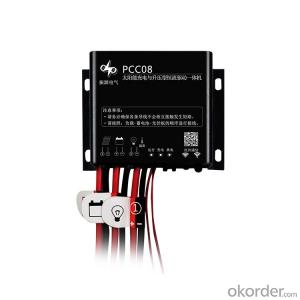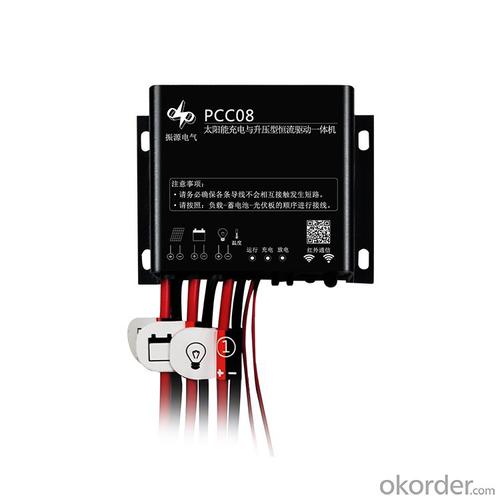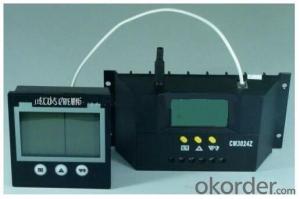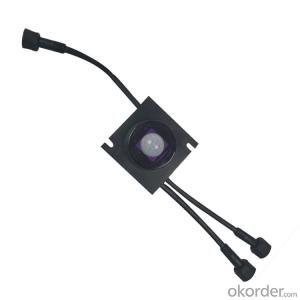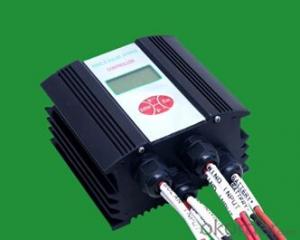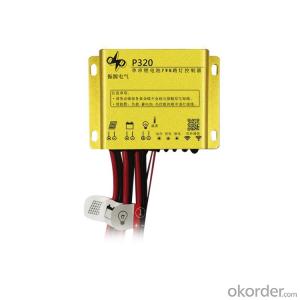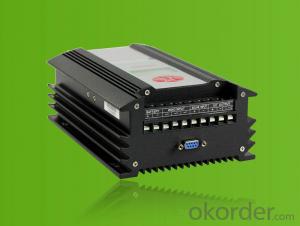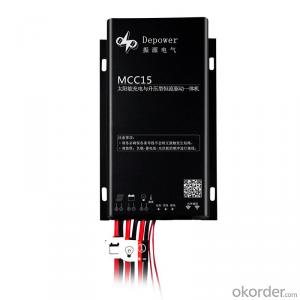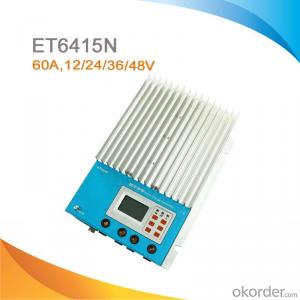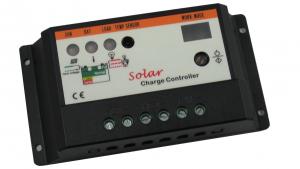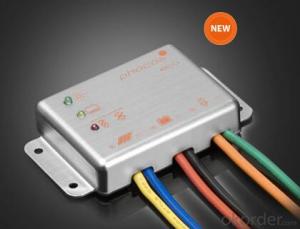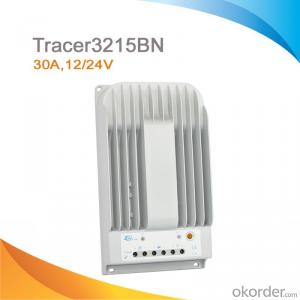Studer Solar Controllers IP68 PCC08 8A 12V PWM Solar Charger Controller for Solar Street Light
- Loading Port:
- China main port
- Payment Terms:
- TT OR LC
- Min Order Qty:
- 1 pc
- Supply Capability:
- 1000 pc/month
OKorder Service Pledge
OKorder Financial Service
You Might Also Like
1.Features :
*Professional design to promote system reliability
-Using international well-know brand semiconductor device.
- High LED driving, significantly reduce the product temperature.
- IP68 protection degree without any buttons, further improve the waterproof reliability.
*Discharge efficiency
- LED constant current drive efficiency up to 96%
-Dimming LED constant current drive efficiency from 91%-96%
*Minimal power consumption
-The current consumption ≤10mA
*Intelligent battery management
-It is PWM and CV charge, which matches with Li protect board perfectly.
- Significantly extends the battery lifetime up to 50% base on intelligent temperature
compensation charge and discharge management.
- Intelligent energy management of battery ensures that the battery charge & discharge in
shallow state which significantly extend the battery life.
*Intelligent LED drive management
- Light control function, automatic lights LED in the dark, turn off automatically at dawn
- Constant current drive
- three times control.
- Delaying infrared body sensor
- Morning lighting
- Dimming function, control to output different power in different typical time.
*Flexible parameter set
- Excellent man-machine interface, convenient operation.
- Infrared wireless communications, connecting with a handheld remote control for easy installation.
*Protect function
- Battery and the solar panel reverse connection protection.
- To prevent the battery discharge to the solar panel .
- Battery low voltage disconnect and reconnect voltage protection.
-The LED output short and open circuit protection.
2. Technical parameter
Model | PCC08 G4 |
System voltage | 12V |
Output power | 40W/12 V |
Static power consumption | 13 mA/12 V |
Rated charging current | 8 A |
Solar panel power | ≤ 120 W |
Solar panel open-circuit voltage | < 25 V |
MPPT tracking efficiency | 96% |
Typical constant current source efficiency | 90% to 96% |
Overvoltage protection | Overcharge voltage 2 V |
Charging voltage limit | Overcharge voltage 1 V |
Current accuracy | ±3% |
Over-temperature protection | 85 °C |
Light control voltage | 16 V ~50 V |
Operating temperature | -35 °C ~+60 °C |
Protection degree | IP68 |
Weight | 180g |
Dimensions (mm) | 58*82*23.5 |
3. Images
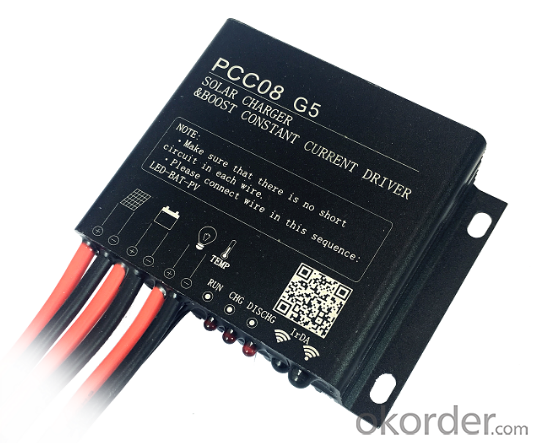
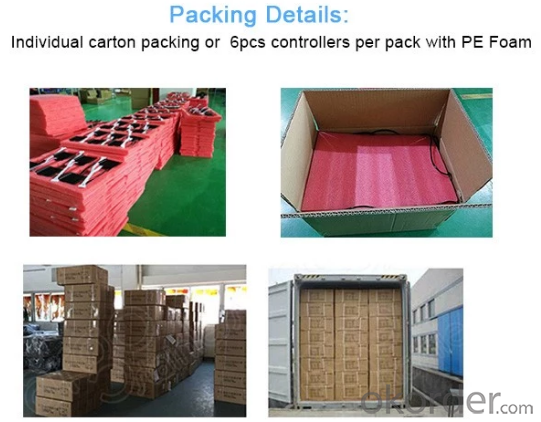
4.FAQ
Q: DO YOU HAVE ANY CERTIFICATION FOR YOUR PRODUCTS?
A: We have ISO9001:2015, CE、 RoHS certifications for all of our products.
Q: DO YOU HAVE MOQ FOR PLACE ORDER?
A: Low MOQ, 1pe for sample checking is available.
- Q: How does a solar controller handle variations in solar panel cleaning frequency?
- A solar controller does not directly handle variations in solar panel cleaning frequency. Its main function is to regulate and optimize the charging and discharging of the battery in a solar power system. However, a well-maintained and clean solar panel will generally provide more efficient energy conversion, which can lead to improved battery charging. Therefore, it is recommended to clean solar panels regularly to maximize their performance and overall system efficiency.
- Q: Can a solar controller be used in both off-grid and grid-tied systems?
- No, a solar controller can only be used in off-grid systems as it regulates the flow of electricity from the solar panels to the battery bank. In grid-tied systems, the solar power is directly fed into the utility grid and does not require a solar controller.
- Q: What are the different types of solar controllers available?
- The different types of solar controllers available include PWM (Pulse Width Modulation) controllers, MPPT (Maximum Power Point Tracking) controllers, and basic on/off controllers.
- Q: Can a solar controller be used with a solar-powered commercial building?
- Yes, a solar controller can be used with a solar-powered commercial building. A solar controller manages and regulates the charging and discharging of solar batteries, ensuring optimal performance and preventing overcharging or damage. It is an essential component in solar power systems, including those used in commercial buildings, to maximize energy efficiency and ensure reliable power supply.
- Q: Can a solar controller be used in a solar-powered weather monitoring system?
- Yes, a solar controller can be used in a solar-powered weather monitoring system. A solar controller regulates the amount of power flowing from the solar panels to the batteries, ensuring the batteries are charged efficiently and preventing overcharging. In a solar-powered weather monitoring system, the solar controller would play a crucial role in managing the power supply to the system, allowing it to operate reliably and sustainably.
- Q: What is the maximum charging time a solar controller can handle?
- The maximum charging time a solar controller can handle depends on the specific model and its capabilities. Typically, solar controllers can handle charging for extended periods, ranging from several hours to even days, depending on the capacity and design of the controller.
- Q: Are there any disadvantages to using a solar controller?
- Yes, there are a few disadvantages to using a solar controller. One disadvantage is the initial cost of purchasing and installing a solar controller, which can be relatively high compared to traditional charge controllers. Additionally, solar controllers may require regular maintenance and monitoring to ensure optimal performance, which can add to the overall maintenance cost. Another potential disadvantage is the limited compatibility of solar controllers with certain solar panel systems, as some controllers may not be compatible with certain types or sizes of solar panels. Lastly, solar controllers may have limitations in terms of the maximum amount of solar power they can handle, which can restrict the scalability of the solar system.
- Q: How does a solar controller handle variations in battery temperature?
- A solar controller is designed to effectively manage and regulate the charging process of a battery in a solar power system. When it comes to handling variations in battery temperature, a solar controller typically employs a few key mechanisms to ensure optimal charging performance and battery longevity. Firstly, a solar controller monitors the battery temperature using built-in temperature sensors. These sensors measure the ambient temperature or directly sense the battery temperature to determine its current state. By constantly monitoring the temperature, the controller can adjust its charging parameters accordingly. When the battery temperature is too low, the solar controller can activate a temperature compensation feature. This feature adjusts the charging voltage to a higher level, compensating for the reduced battery capacity caused by low temperatures. By increasing the charging voltage, the controller ensures the battery receives a sufficient charge and prevents undercharging. Conversely, when the battery temperature is too high, the solar controller protects the battery from overheating. It achieves this by reducing the charging voltage or current to prevent excessive heat generation. By limiting the charging parameters, the controller prevents the battery from being damaged or experiencing accelerated aging due to high temperatures. Furthermore, some advanced solar controllers may incorporate additional features to handle variations in battery temperature. For instance, they can have an integrated fan or heat sink to dissipate excess heat generated during charging. This helps to maintain the optimal temperature range for the battery and prevent any potential damage. Overall, a solar controller handles variations in battery temperature by closely monitoring it and adjusting the charging parameters accordingly. By compensating for low temperatures and protecting against high temperatures, the controller ensures the battery is charged optimally and maintains its longevity.
- Q: How do I determine the maximum load output current for a solar controller?
- To determine the maximum load output current for a solar controller, you will need to consider a few key factors. Firstly, check the specifications provided by the manufacturer of the solar controller. This information is usually available in the product manual or on the manufacturer's website. Look for the maximum load output current rating, which is typically given in amps (A). Additionally, consider the size and capacity of your solar panel system. The maximum load output current of the solar controller should be compatible with the capacity of your solar panels. If your solar panels have a higher output current than the controller's maximum load output current, it may lead to system inefficiencies or potential damage. Moreover, it is important to consider the load you intend to connect to the solar controller. Determine the maximum current that the load requires to operate properly. Ensure that the load's current requirement is within the range supported by the solar controller. If the load's current requirement exceeds the maximum load output current of the controller, it may result in the overload or malfunctioning of the controller. Lastly, always consult with a professional or an electrician experienced in solar systems if you have any doubts or concerns. They can provide valuable advice based on your specific system requirements and help ensure that the solar controller is properly matched with the load and solar panel capacity.
- Q: Can a solar controller be used with solar panels that are connected to a battery isolator?
- Yes, a solar controller can be used with solar panels that are connected to a battery isolator. A solar controller is designed to regulate the charging of batteries from solar panels, ensuring that they are charged efficiently and safely. When solar panels are connected to a battery isolator, the solar controller can still effectively manage the charging process by controlling the flow of solar power to the batteries. The battery isolator acts as a device that allows power to flow from the solar panels to the batteries while preventing power from flowing back to the solar panels. This setup is commonly used in off-grid solar systems or in situations where multiple battery banks need to be charged simultaneously. By using a solar controller in conjunction with a battery isolator, the solar panels can effectively charge the batteries while protecting them from overcharging or damage.
Send your message to us
Studer Solar Controllers IP68 PCC08 8A 12V PWM Solar Charger Controller for Solar Street Light
- Loading Port:
- China main port
- Payment Terms:
- TT OR LC
- Min Order Qty:
- 1 pc
- Supply Capability:
- 1000 pc/month
OKorder Service Pledge
OKorder Financial Service
Similar products
Hot products
Hot Searches
Related keywords
